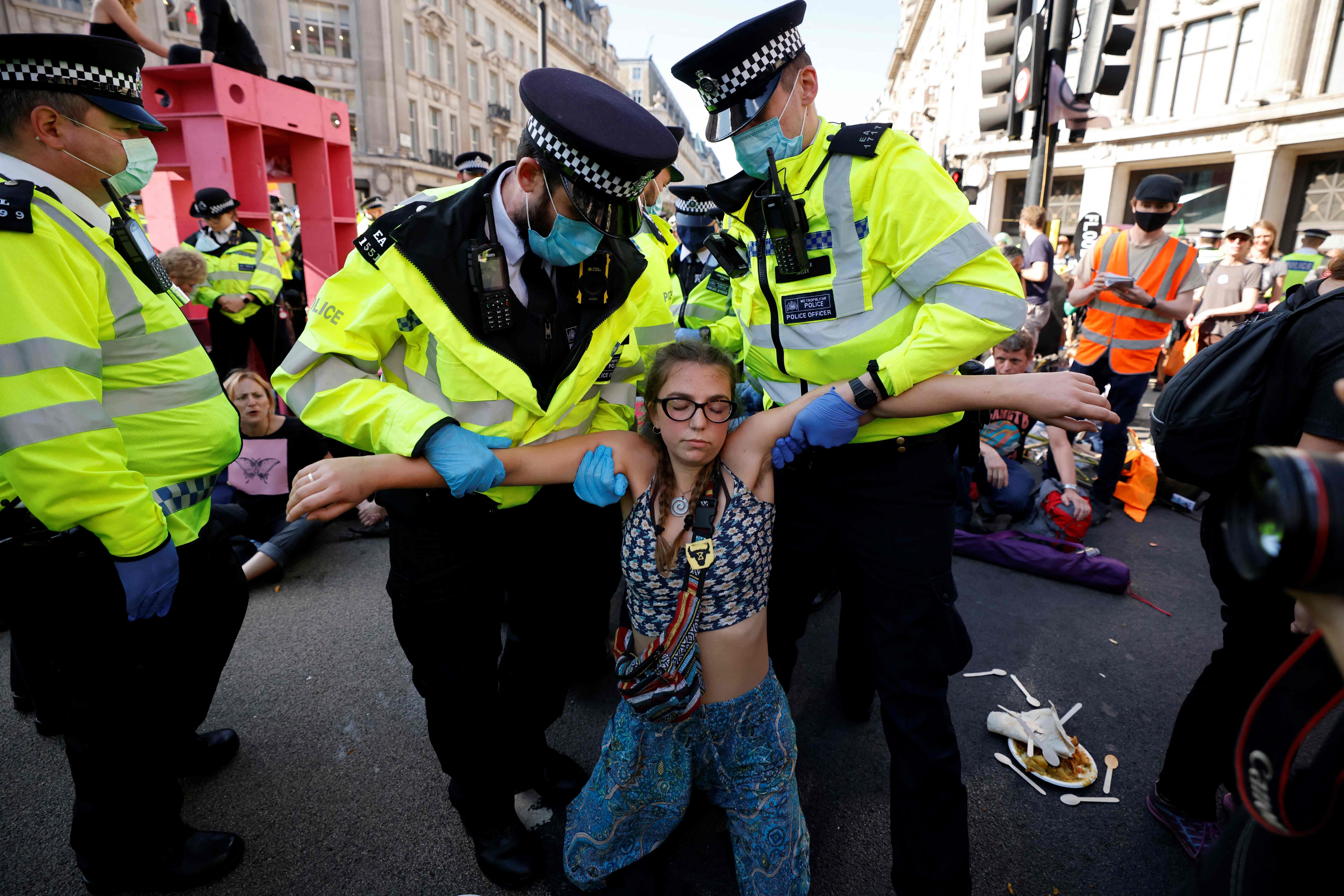The key moments that will shape the climate crisis in 2023
Shifting protest tactics, scrutiny for green-washers and cheaper electric vehicles are coming down the pike this year. Louise Boyle reports


Your support helps us to tell the story
From reproductive rights to climate change to Big Tech, The Independent is on the ground when the story is developing. Whether it's investigating the financials of Elon Musk's pro-Trump PAC or producing our latest documentary, 'The A Word', which shines a light on the American women fighting for reproductive rights, we know how important it is to parse out the facts from the messaging.
At such a critical moment in US history, we need reporters on the ground. Your donation allows us to keep sending journalists to speak to both sides of the story.
The Independent is trusted by Americans across the entire political spectrum. And unlike many other quality news outlets, we choose not to lock Americans out of our reporting and analysis with paywalls. We believe quality journalism should be available to everyone, paid for by those who can afford it.
Your support makes all the difference.2022 was a year of peaks and troughs in the climate fight. To name a few: The year marked the highest level of fossil fuel-driven carbon emissions in history (extreme low) but also groundbreaking US climate legislation and milestone global agreements on climate compensation and reversing destruction of nature (highs!)
What does 2023 have in store? Here’s some big moments to look out for.
CLEAN TECH GETS TURBOCHARGED
Vladimir Putin’s brutal invasion of Ukraine unexpectedly led to massive gains in the clean energy sector last year, and it is set to continue. According to the influentional International Energy Agency (IEA), the world will add as much renewable power in the next five years as it did in the past two decades.
The IEA’s latest assessment found that renewables are expected to make up over 90 per cent of global electricity expansion over the next five years, overtaking coal to become the largest source of electricity in just two years’ time.
It’s not the only clean tech that will further ramp up this year. Boom times will continue in electric vehicle (EV) sales even amid turbulent waters at Tesla and a lag in charging stations rollout.
EV sales doubled in 2021 to 6.6 million, IEA reported, and despite supply chain snarls in 2022, sales steadily rose. The trend will continue this year with the number of EVs on the road expected to be 20.6 million in 2025, according to BloombergNEF.
Stumbling blocks like the rising cost of batteries won’t halt the upwards trajectory, Bloomberg noted, particularly as gasoline and diesel vehicles become more expensive to make. 2023 will also see new models of EVs at more affordable prices,TechCrunch reported.
The charging network is already struggling to keep up with demand. In the US alone, EV charging stations must increase eight-fold by 2030, auto-industry site CBT News recently reported.

SHIFTING PROTEST TACTICS
The climate activist movement, Extinction Rebellion (XR), announced on 1 January that in the UK it would temporarily shift away from using public disruption to draw attention to the climate crisis.
The change was “very much” in response to public backlash over XR’s tactics, spokesperson Marijn van de Geer acknowledged, which have included blocking roads, sit-ins and mass arrests.
XR also pointed out that increasing numbers of people want governments to do more to tackle the climate crisis. So, the activists have launched a new 100-day campaign that will culminate in a protest dubbed “The Big One” outside UK Parliament buildings on 21st April that they hope will attract 100,000 people.
“XR is committed to including everyone in this work and leaving no one behind, because everyone has a role to play. This year, we prioritise attendance over arrest and relationships over roadblocks, as we stand together and become impossible to ignore,” the group said in a statement.
Fellow protest groups, Just Stop Oil and Insulate Britain, have pledged to continuing acts of civil resistance.
“It’s 2023 and XR has quit,” Just Stop Oil told The Independent in a statement, aligning their climate protest strategy with NHS workers’ strikes in recent weeks. “There is no impunity from the coming storm, no free pass for the public. Ordinary people will be left to face it first, not knowing if they should stay in their homes or if they leave where they can go. No one is coming to save us - we must continue resisting a harmful, criminal government.”
Another activist group, Insulate Britain, also voiced support for the UK’s striking nurses, ambulance drivers and railway workers and said its supporters remain committed to civil resistance as “the only appropriate and effective response to the reality of our situation in 2023”.
“Supporters of Insulate Britain are prepared to continue to risk being sent to prison, with 13 supporters still in prison over Christmas, because they understand that this is what it will take to divert our government away from its current death project of new oil and gas, and cold and leaky homes,” read a statement, emailed to The Independent. “Thousands of everyday people in civil resistance on motorways, roads and critical national infrastructure is what is needed right now because it gets results.”
RENEWED HOPE FOR THE AMAZON
Luiz Inácio Lula da Silva, universally known as Lula, was inaugurated as Brazil’s president for the third time on New Year’s Day and immediately announced plans to end illegal deforestation in the waning Amazon.
The rainforest is a natural buffer against the climate crisis by absorbing vast amounts of planet-heating carbon dioxide. However as the dense forest is slashed and burned, scientists have warned that the Amazon is dangerously near a tipping point to become a net carbon emitter.
Among his first acts as president, Lula reestablished an Amazon fund for sustainable development in the rainforest.

He has also appointed several key cabinet members to bolster his mission. Longtime environmentalist, Marina Silva, from the Amazonian state of Acre, was named environment minister. She previously held the position in Lula’s administration and spurred a huge decline in deforestation.
Sônia Guajajara, leader of the main umbrella group for Brazil’s many Indigenous tribes, made history as the first ever head of a new Ministry of Indigenous People.
The majority of Brazil’s Indigenous territories are located in the Amazon and the communities are frontline defenders of the forest and its rich biodiversity. They have been killed in increasing numbers amid invasions of their lands for illegal logging, ranching and mining.
“This is more than a personal achievement,” Guajajara said. “It is a collective achievement of the Indigenous peoples, a historic moment of reparation in Brazil.”
WORDS INTO ACTION
The most significant climate law in US history will be implemented this year. Officially known as the Inflation Reduction Act, it will funnel $370billion into decarbonizing every corner of the American economy from electric vehicles (EV) to wind farms and battery storage at the national and statewide level.
The legislation also has the potential to make an impact from house to house as it includes measures to help Americans cover the costs of home improvements from installing solar panels and heat pumps to insulation and adding EV chargers.
It is expected to have a ripple effect globally, according to strategists Wood Mackenzie, as other countries will introduce incentives to keep up with what’s on offer in the US.
“That will be a net gain for the world, not a zero-sum game: a levelling-up of policy support will unlock new business opportunities for the entire globe,” a recent forecast noted.
However, expect some bumps in the road. The New York Times reported in October that oil and gas industry lobbyists were making the rounds on Capitol Hill to undermine the IRA’s anti-fossil-fuel agenda among sympathetic lawmakers. One reported strategy is to hollow out a $4.5bn program to would help low-income households replace gas appliances with electric ones.
‘NO NONSENSE’ TIME
2023 is the year of the United Nations’ “Global Stocktake,” a key part of the Paris Agreement that will be a de-facto report card on countries’ progress in cutting emissions, and provide a launchpad for plans to carry through this consequential decade. (Global emissions need to be cut roughly in half in the next seven years to stick to the 1.5C temperature limit - a target which is currently way, way off track).
UN Secretary General Antonio Guterres suggested that he will be taking no prisoners at the stocktake in September.
“There is a price of entry and the price of entry is non-negotiable — credible, serious and new climate action. It will be a no-nonsense summit. No exceptions. No compromises. There will be no room for back-sliders, greenwashers, blame-shifters or repackaging of announcements of previous years,” he said.
Separately, the US Securities and Exchange Commission (SEC) is expected to release new rules in 2023 (when exactly has yet to be announced) requiring public companies to report carbon footprints and climate risks. It will bring some much-needed transparency into who, and what, is behind the planet’s still-rising emissions tally.
SPOTLIGHT ON DEBT
A major focus of the Cop27 climate summit in Egypt this past November was how the global financial architecture unfairly burdens developing and poor countries with high levels of debt when they request funds to recover from extreme weather events. Not only does it leaving these nations struggling to make repayments, but prevents their investment in long-term plans and infrastructure that would help ward off future crises.
One of the most vocal advocates for overhauling the global financial system is Barbados Prime Minister Mia Mottley, whose “Bridgetown agenda” lays out a framework on how it could be done.
The plan will be presented by Barbados at the spring meeting of the International Monetary Fund (IMF) and World Bank in April in Washington DC.
The plan has already gained traction with leaders of some wealthy countries notably France’s Emmanuel Macron, who will also host a June summit with PM Mottley on the issue.






Join our commenting forum
Join thought-provoking conversations, follow other Independent readers and see their replies
Comments